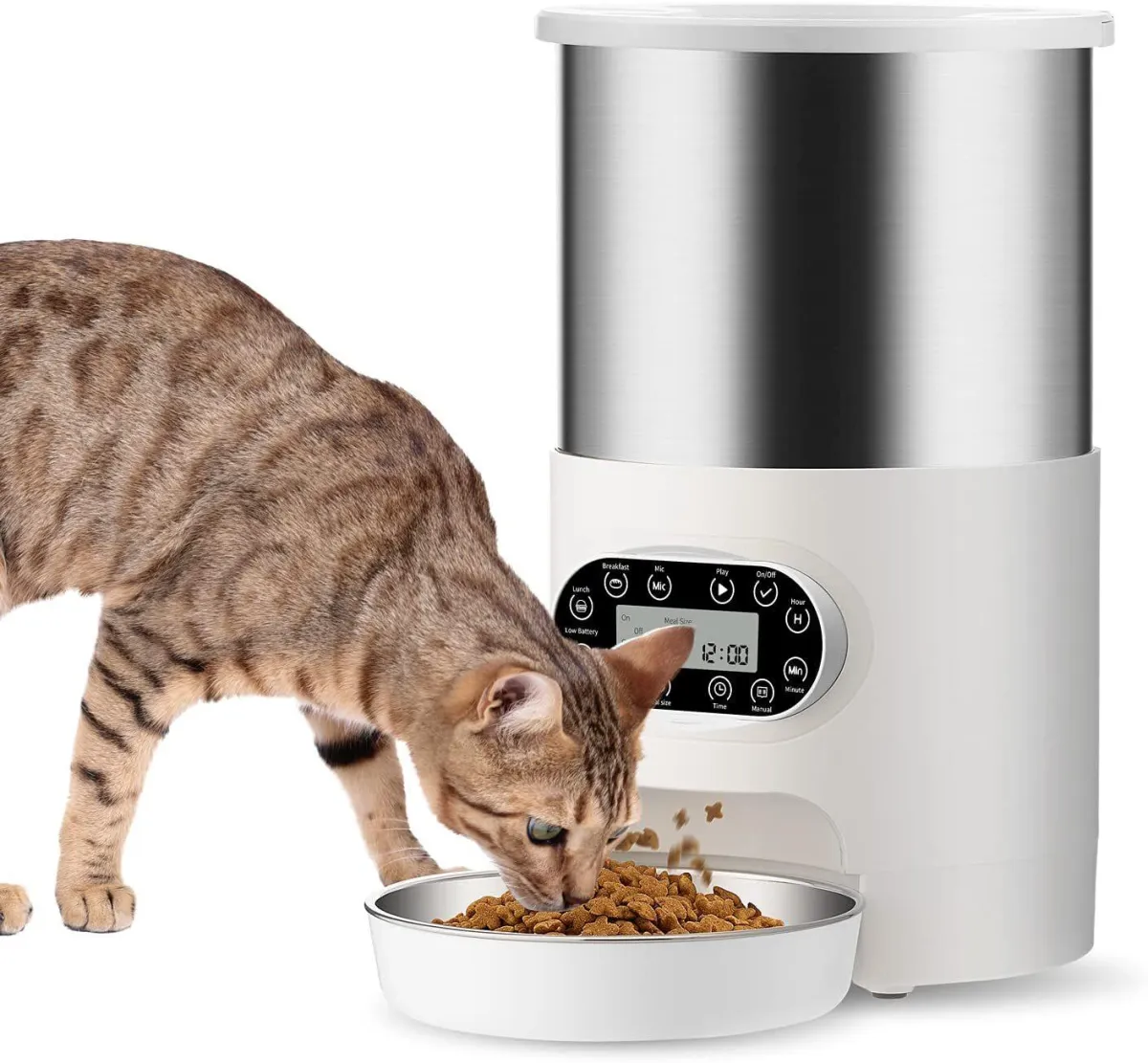Pawsome
Blog

Solving Early Morning Wake-Up Calls: The Emotional and Logical Benefits of Using Automatic Pet Feeders

Dear Pet Parents
If you’ll give me 2 minutes I’ld like to share a story with you before going further into this new blog. This story may be familiar within many of your households.
In the last 12 months my family, consisting of my wife and 3 adult children, have moved into a new rental property. Now while my wife first agreed we would have no pets in this new property, being pet lovers when our children asked if they could bring dogs and then cats into the home it didn’t take long for our arms to be twisted into agreement. We did tell our children it was their responsibility to look after their pet though.
For those children who brought cats into the home, a familiar situation all too common to cat parents started too occur though. This familiar event started to annoy our children, too which my wife and I simply expressed…
“Welcome to being a pet parent!”
If you’re a pet parent, you’ve likely experienced the all-too-familiar tap of paws on your cheek or the insistent meowing beside your bed at dawn. For many cats—and even some dogs—the first light of morning signals breakfast time. While their eagerness is endearing, it can quickly leave you sleep-deprived and stressed. Early morning wake-up calls are one of the most common pet parent frustrations.
Enter the automatic feeder: a simple yet transformative solution that restores your sleep, builds healthier routines, and strengthens your bond with your furry friend.
The following blog will unpack the emotional and logical benefits of using feeders to finally put an end to those 5 A.M. demands.
Why Do Pets Wake Us So Early?
Before exploring the advantages of feeders, it’s important to understand why pets wake us for food.
Natural instinct: Cats are crepuscular, meaning they’re most active at dawn and dusk. In nature, these are peak hunting times. Dogs, while more adaptable, will still often rise early with the sun.
Conditioned behavior: Pets learn routines quickly. If you’ve ever fed your cat right after they meowed in the morning, you’ve reinforced that waking you works.
Hunger cues: If dinner is served too early in the evening, pets may genuinely be hungry at dawn.
The combination of natural rhythms and learned habits means that without intervention, the cycle continues—and your sleep suffers.

The Emotional Benefits of Using Feeders
Automatic feeders don’t just serve food—they restore harmony in the home and peace for both you and your pet.
1. Reclaiming Your Sleep and Sanity
Being woken up every morning can take a toll. Chronic sleep disruption leads to fatigue, irritability, and reduced focus. With a feeder, you can sleep soundly knowing your pet’s meal will be served right on time without your intervention.
2. Reducing Pet-Parent Stress
Morning wake-up calls often create tension between loving your pet and resenting their neediness. An automatic feeder removes the stress of having to choose between ignoring their cries or stumbling out of bed. This leads to a calmer, more positive relationship.
3. Giving Pets Emotional Security
Pets feel secure when they have predictable routines. A feeder provides consistent, on-time meals—even if you oversleep or work late. This emotional reassurance reduces anxiety in pets prone to restlessness or mealtime fixation.
4. Strengthening the Bond with Your Pet
When you’re not the person controlling every mealtime, you’re no longer cast as the “food gatekeeper.” This frees space for your interactions to be based on play, cuddles, and affection rather than demands for food. The shift creates a healthier, warmer emotional bond.

The Logical Benefits of Using Feeders
Beyond emotional wellbeing, feeders bring very tangible, practical advantages.
1. Consistent Feeding Schedules
Automatic feeders let you program exact meal times, whether it’s 6:00 A.M. sharp or spread into multiple smaller meals throughout the day. This reliability is beneficial for both pets and humans—no more guilt about forgotten meals or rushed feeding before work.
2. Portion Control and Preventing Obesity
Overfeeding is a major cause of pet obesity, especially for indoor cats and smaller dogs. Feeders allow you to measure precise portions each time, helping maintain your pet’s ideal weight and reducing the risk of weight-related illnesses.
3. Convenience for Pet Parents
Whether you’re sleeping in on weekends, working late hours, or going on a short overnight trip, feeders provide flexibility. You don’t have to feel tethered to your pet’s meal clock, and you gain freedom without compromising their care.
4. Reducing Behavioral Problems
Pets who constantly beg for food can develop attention-seeking behaviors like meowing, barking, or pawing. Feeders shift that energy away from you and onto a predictable device, gradually decreasing pestering and stress for everyone.
5. Supporting Multi-Pet Homes
If you live with multiple pets, feeders make meal management easier. Some advanced feeders can be microchip-activated, ensuring the right pet gets the right portion—perfect for preventing food theft between cats or dogs.
Case Study: A Cat Parent’s Experience
For example, consider Lisa, a cat owner who works inconsistent shifts. Each morning before sunrise, her cat Jasper would leap onto her bed, loudly demanding breakfast. Lisa loved Jasper but struggled with broken sleep and growing frustration. After investing in an automatic feeder, she noticed an instant transformation:
Jasper stopped waking her at 5:00 A.M. because he began trusting the feeder’s schedule.
Lisa’s stress levels dropped, and she could enjoy the mornings without resentment.
Jasper seemed less anxious, as his meal times became routine no matter Lisa’s schedule.
This simple shift allowed Lisa and Jasper to rebuild a peaceful home rhythm—an excellent example of both logical and emotional benefits working together.
Tips for Transitioning Your Pet to a Feeder
Not every pet will instantly accept a new feeding method. Here’s how to introduce it smoothly:
Introduce gradually: Start by serving some meals manually in the feeder bowl so your pet recognizes it as their dish.
Use positive association: Pair the new feeder with treats, praise, or interactive play to make it exciting.
Stick to consistency: Once programmed, keep the schedule fixed to build trust and predictability.
Avoid over-reliance: While feeders are convenient, continue to bond with your pet during other routines, like grooming and playtime.
Emotional Benefits for You and Your Household
Automatic feeders don’t just benefit the immediate pet-parent relationship—they positively influence the entire household.
Family harmony: If a pet insists on waking one family member while others sleep, it can create resentment in households. Feeders evenly distribute responsibility, letting everyone enjoy rest.
Kids and routines: For families with children, feeders teach responsibility around pets while ensuring reliability, even if someone forgets to fill a bowl.
Travel reassurance: Whether you’re away for the day or staying overnight, knowing your pet is consistently cared for provides peace of mind and reduces anxiety.
Logical Investment in Your Pet’s Health
Investing in a feeder isn’t just about convenience; it’s about long-term wellness.
Preventative healthcare: Pets eating at consistent times with controlled portions are less prone to obesity, diabetes, or digestive upsets.
Multi-meal options: Some feeders allow scheduling multiple small meals per day, aligning with modern veterinary advice to avoid overeating and promote healthier digestion.
Medication reminders: Some feeders allow integration with medication schedules, ensuring pets reliably receive supplements or pills hidden in food.
Common Concerns and Solutions
Many pet parents hesitate to use feeders due to misconceptions:
“Will my pet stop bonding with me?”
No—your pet will still seek affection, cuddles, and play. The bond often improves when food isn’t the central issue.“What if the feeder malfunctions?”
Quality feeders are reliable. Choosing reputable, tested models minimizes this risk. As a precaution, keep extra food and water bowls available when traveling.“Isn’t it expensive?”
Feeders vary in price. While premium models have advanced functions, even budget feeders provide essential consistency. The health benefits and improved quality of life soon outweigh the investment.
The Bigger Picture: Quality of Life
When you think about it, an automatic feeder isn’t just a gadget—it’s a lifestyle upgrade. It allows pets to thrive with routines that match their instincts, while freeing humans from the constant burden of responding to early-morning pleading.
Imagine waking naturally, enjoying your morning coffee without interruption, and engaging with your pet on your terms—not because they’re hungry. That’s the emotional freedom feeders deliver. Logically, it also means longer, healthier lives for pets through better meal management.
Final Thoughts
Automatic feeders solve one of the most persistent challenges of pet ownership: early morning wake-up calls. They balance emotional needs by restoring harmony, reducing stress, and creating stronger bonds, while also delivering logical benefits like portion control, convenience, and consistent health routines.
For pet parents, this isn’t just about sleep—it’s about reclaiming your own wellbeing while ensuring your beloved companion feels secure and cared for. Early morning wake-ups don’t have to be the defining story of your pet ownership journey. With the right feeder, both you and your pet can start each day on the right paw—with rest, balance, and happiness.
At Pawsome Harmony we have a wide selection of automatic pet feeders, believing that the wellbeing of household is optimized when every member of the family is functioning is harmony.

Contact Us
Bedford Park, Sth Australia. Australia. 5253